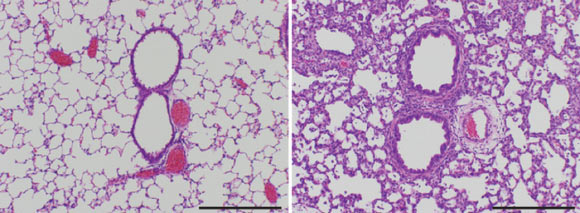A multinational team of researchers led by Prof Stefanie Vogel from the University of Maryland has found that an experimental drug called Eritoran can protect mice from death after they have been infected with a lethal dose of the mouse-adapted influenza virus strain known as PR8.

Eritoran treatment also improves lung pathology of H3N2 infection of cotton rats. Scale bars – 500 µm (Kari Ann Shirey et al)
Eritoran has shown promise in treating influenza, preventing lung injury and death from the virus in preclinical studies. The potential value of this drug as single therapy or in combination with antivirals is further supported by previous research that found that it is safe for use in humans.
The results, published in the journal Nature, are of particular interest to researchers now that a novel influenza A (H7N9) virus is spreading in China.
Previous studies revealed that acute lung injury caused by the influenza virus is the result of an immune reaction mediated by a protein called Toll-like receptor 4 (TLR4).
Prof Vogel’s team earlier demonstrated that mice that lack the ability to signal through TLR4 are highly refractory to influenza-induced lethality.
In the new study, they extend these findings by showing that Eritoran – a synthetic inhibitor of TLR4, originally developed by Eisai Inc. for treatment of sepsis – improved clinical symptoms and prevented death when administered up to six days after infection with the influenza virus. Existing antiviral medications must be administered within two days of infection to be optimally effective.
“Currently, vaccines and antiviral medications are the two main approaches to preventing influenza,” Prof Vogel said.
“Problems associated vaccine development may limit efficacy and/or vaccine availability. In addition, people suffering from influenza may not go to the doctor or to the emergency room in time for the antivirals to be effective. Also, as the flu adapts to resist existing treatments, we are in search of new therapies to save lives and prevent severe illness.”
“Our research seems to show that Eritoran could provide doctors with a new tool in their flu-fighting toolbox, as well as several more days to treat the sickest of patients successfully. More basic research is needed, but we are hopeful that this medication could one day change the way that we treat severe influenza and possibly other pathogens that cause disease by a similar mechanism.”
______
Bibliographic information: Kari Ann Shirey et al. The TLR4 antagonist Eritoran protects mice from lethal influenza infection. Nature, published online May 01, 2013; doi: 10.1038/nature12118







